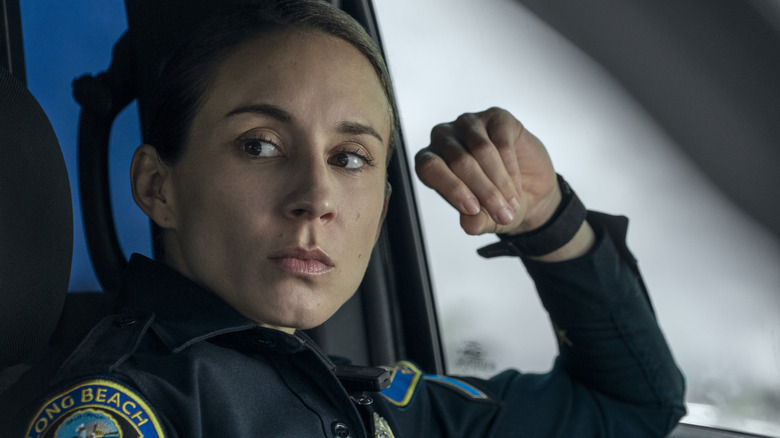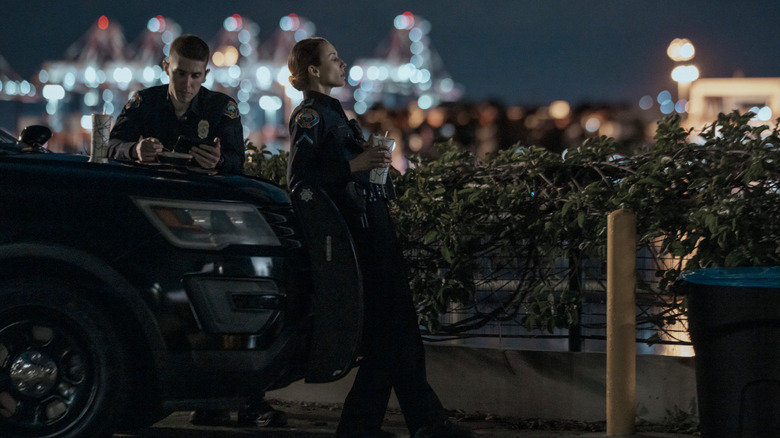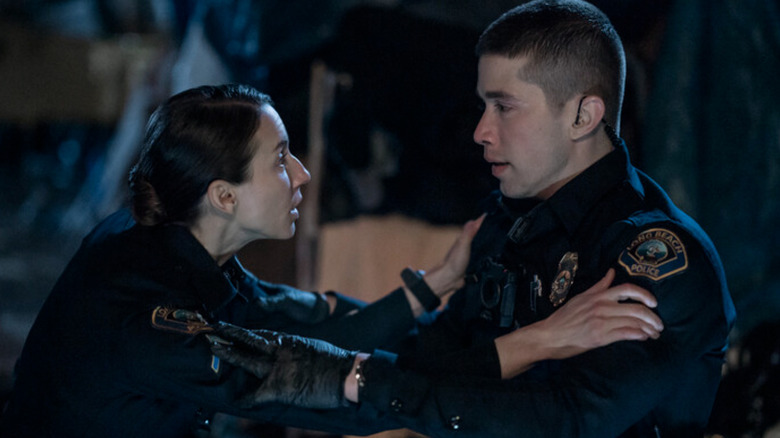On Call Review: Less Fun Than Getting Arrested
- It’ll make you want to revisit better cop shows
- Cliche-riddled storytelling
- Formulaic, uninteresting characters
- Has a reactionary, “anti-woke” undertone
They may have long been overshadowed by grittier crime dramas in the rise of cable television and streaming, but several iterations of "Law & Order" remain resiliently on the air, decades and dozens of seasons into their runs. The franchise reliably reaches an audience of millions weekly on CBS, without making much of a dent into the cultural conversation online; you would be forgiven for assuming it had been cancelled years ago.
The weekly procedurals, rotating between different cases each episode, are hard to replicate in the age of the streaming binge-watch, where the most enduring series reward patience with overarching storylines. But creator Dick Wolf has belatedly tried to adapt the formula for a new generation regardless, with a tougher sensibility than a primetime telecast would allow, firmly aimed at a younger audience weaned on grittier prestige drama and shocking police cam footage clogging their social media feeds.
The result is the confused first season of "On Call," a half-hour saga set in the Long Beach Police Department aiming to flesh out the experiences of beat cops in short, sharp bursts. Episodes are awkwardly divided between an overarching story where police aim to find a cop killer who gunned down one of their best officers in broad daylight, and random excerpts from the cases they attend to while on shift; the continuing storyline ensures it can't be enjoyed as an episodic cop show like its broadcast counterparts, and is too generic and reliant on cliché to hold interest by itself.
Not a single original idea
Netflix recently announced that they would be encouraging writers of their scripted series to start including more expository dialogue so people on their phones could keep up with storylines, a much-criticized technique that has been standard practice in traditional TV for years. The most impressive thing about "On Call" is that, even though it similarly ushers this lazy approach to writing into a streaming platform, you'll still feel yourself zoning out everything that is going on anyway.
The first episode cold opens with cop Maria Delgado (Monica Raymond) shot by the imaginatively titled criminal Maniac (Ian Down), an event which shocks the LBPD. She was a former pupil of training officer Traci Harmon (Troian Bellisario), and amid Traci's grief she's assigned to tutor a new partner, Alex Diaz (Brandon Larracuente), who she immediately has little patience for. As you'd expect from any mismatched buddy cop dynamic, the pair comes to a less-than-begrudging respect for each other, but other colleagues try to intervene, suggesting Traci isn't someone to be trusted as she always puts her career before her fellow officers — and rumors about her secretive family history only create further mystique about potential ulterior motives.
Throughout, the show aims to differentiate itself from the established style of Dick Wolf's TV institutions with rawer dramatized bodycam footage, in a manner slightly reminiscent of David Ayer's found footage cop movie "End Of Watch," which feels like one of the key creative inspirations for this project (it could also be getting a TV adaptation very soon). I'm far cooler on that movie than most, as I felt it couldn't quite cover up its formulaic storytelling and clichéd characterization with its revitalizing stylistic conceit, but it at least had two charismatic leads. Nobody could accuse "On Call" of having similarly attention-grabbing protagonists, both of whom are devoid of any character beyond what their job description entails. And as for how they approach the job itself, well, the tension between playing by the book and breaking the rules has been done to death in cop dramas for years now — maybe a spark of personality could have helped the trope go down easier. The only standout quirk the series boasts is the abundance of awkward mid-scene zooms, which shatters the illusion of realism and will likely leave viewers wondering if they accidentally turned motion smoothing on.
Yes, it's copaganda — but it has bigger problems
As with most police force procedurals, "On Call" is unambiguous copaganda, albeit not in a particularly insidious way; it's too unoriginal to inspire anybody as a recruitment commercial. Despite having two relatively youthful leads plucked from teen dramas of the prior decade — "Pretty Little Liars" and "13 Reasons Why" respectively — the show is as out of touch with younger generations as you'd expect, something which comes into deeper clarity whenever generational divides are brought up in the narrative. Earlier in the season, the writers aim to give Alex a moral ultimatum, making him question whether he stays loyal to his by-the-book mentor, or takes the advice of the station's sergeant (Eriq LaSalle, who also directs several episodes) and not succumb to "woke" policing. This translates as fighting back against any suspect who gets violent, a euphemistic term for the historic sins of California's police departments — having an African American actor deliver this dialogue makes this strange argument in favor of police brutality all the stranger to witness. It would be interesting if the show was eager to explore this further, especially as seen through the eyes of a new recruit, but the series sweeps it under the carpet; it has so little to say on the subject, the moment doesn't even register as shock value.
Elsewhere, the series doesn't disguise its conservative leanings, which shouldn't be a shock considering the political affiliation of its creator, but its key recurrent targets felt somewhat unusual for a police procedural. Homeless encampments appear frequently throughout, their residents depicted with a unanimous condescension both by the characters and those behind the camera, and sex workers are treated with a scorn I didn't realize anybody still harbored in the post-OnlyFans era. There are more incendiary moments too, such as one subplot in which the pair are called to a house where a man alleges being attacked by a burglar, only to reveal in front of his wife that this was a Grindr hookup he brought over to engage in some light BDSM while his spouse was out shopping. It's treated as a lighter moment, juxtaposing with more harrowing, violent calls they attend to, but the final beat felt less so, with Alex telling the hookup in no uncertain terms to "stay away" from this world of vice — a warning that felt more homophobic than puritanical. I'd call it out of step with the times if it weren't for a recent election suggesting that it might be closer to the mood of the nation than is comfortable to think.
Ultimately, these brief moments of lightning-rod right-wing moralism are the only memorable parts of this series. Riddled with clichés and uninspired in its criminal underworld narrative, it's as boring as this genre gets — the episodes may only be half an hour, but they feel a hell of a lot longer.
"On Call" premieres on Amazon Prime on January 9.


